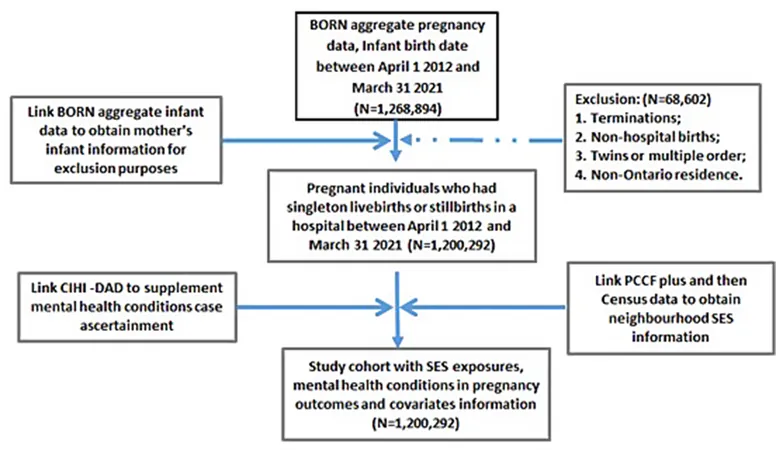
The Alarming Link Between Socioeconomic Status and Mental Health During Pregnancy in Ontario
2024-12-23
Author: Olivia
In Focus: The Alarming Link Between Socioeconomic Status and Mental Health During Pregnancy in Ontario
A comprehensive study conducted in Ontario, Canada, sheds light on a pressing public health issue: the significant correlation between mental health conditions in pregnant individuals and socioeconomic status (SES). As the World Health Organization increasingly categorizes maternal mental illness as a critical concern, research has predominantly highlighted that those from lower socioeconomic backgrounds are particularly vulnerable.
Setting the Stage: Understanding the Connection
Maternal mental health is not just a personal issue; it has profound implications for the health of both mother and child, influencing birth outcomes and early childhood development. According to data gathered from over 1.2 million pregnancies in Ontario spanning nearly a decade (April 1, 2012, to March 31, 2021), it was found that a notable percentage of pregnant individuals grappled with anxiety and depression.
The study reveals that 10.5% of these pregnancies saw anxiety, and 8.1% faced depression, complexly interlinked with SES factors—specifically, residential neighbourhood income and education level.
Key Findings: A Distressing Trend
What the research laid bare was striking: pregnant individuals residing in the lowest neighbourhood income quintile had a significantly higher risk of experiencing mental health issues. A comprehensive analysis indicated: - Individuals in low-income areas showed a 24% increase in anxiety and a staggering 56% rise in depression symptoms compared to those in high-income neighbourhoods. - Likewise, education played a critical role: those in neighborhoods with the lowest educational attainment had 66% more anxiety and over 100% more depression compared to their higher-educated counterparts.
The marked decline in mental health conditions parallel to rising SES underscores a severe health inequity in the context of Ontario's healthcare system, which is universally accessible.
Global Context: A Broader Public Health Challenge
This trend is not unique to Ontario. Similar findings have emerged globally, where lower SES is consistently linked to higher prevalence of mental health disorders during pregnancy. For instance, studies in Vietnam and the Netherlands reaffirm this correlation, indicating that external stressors such as poverty, lack of education, and limited access to healthcare services weigh heavily on expectant mothers.
The WHO has highlighted this vulnerable group, advocating for global support and tailored perinatal mental health services. Their findings emphasize that mental health conditions in pregnancy not only affect the mother but can reverberate through generations, profoundly impacting child development and family stability.
Looking Ahead: Addressing the Inequity
With the disparities revealed by this study, the need for targeted interventions has never been clearer. The research advocates for policy changes that could lead to improved mental health services for low-income and lower-educated expectant parents. As Ontario grapples with these findings, specialists urge immediate action to develop comprehensive mental health support systems tailored for these high-risk populations.
In conclusion, the exploration of maternal mental health through the lens of socioeconomic status not only raises awareness about an emerging public health crisis but also calls for urgent, informed responses from policymakers to bridge the health equity gap, ensuring that every mother has access to vital mental health resources during the pivotal stages of her life.
Stay tuned as we continue to follow this important issue—because every mother and child deserves a fair chance at a healthy start.









 Brasil (PT)
Brasil (PT)
 Canada (EN)
Canada (EN)
 Chile (ES)
Chile (ES)
 España (ES)
España (ES)
 France (FR)
France (FR)
 Hong Kong (EN)
Hong Kong (EN)
 Italia (IT)
Italia (IT)
 日本 (JA)
日本 (JA)
 Magyarország (HU)
Magyarország (HU)
 Norge (NO)
Norge (NO)
 Polska (PL)
Polska (PL)
 Schweiz (DE)
Schweiz (DE)
 Singapore (EN)
Singapore (EN)
 Sverige (SV)
Sverige (SV)
 Suomi (FI)
Suomi (FI)
 Türkiye (TR)
Türkiye (TR)